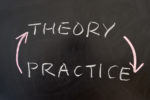As an Amazon Associate I earn from qualifying purchases.
 OK, this is one of those questions where our practice is often at odds with what we say we do. What am I talking about? The big question, WHAT COMES FIRST, THE TEXT OR THE IDEA? Some people will say that you are doing something illegitimate if you have a sermon idea before you have a text. But many of us definitely do that.
OK, this is one of those questions where our practice is often at odds with what we say we do. What am I talking about? The big question, WHAT COMES FIRST, THE TEXT OR THE IDEA? Some people will say that you are doing something illegitimate if you have a sermon idea before you have a text. But many of us definitely do that.
Some preachers tell me that you should always start with the text and let the sermon ideas flow from there. Addressing the needs of the community to affect what you preach is thought to usurp the authority of the Bible.
Let me say that I disagree with that stand. I believe that one can have an idea or a theme first. And as long as you do not allow that idea or theme to take over for the Biblical witness, you can still preach a faithful sermon. In fact, I would argue that ALL of us go to the scripture with ideas and thoughts and interests, and questions. Your question is not my question all the time. Grandma’s question is not my son’s question all the time. And your questions do and must affect what we even see when we go to the text.
Now please don’t say, “Brother Cox says we need to preach our feelings and tack a text on at the end of it.”
That ain’t what I am saying. Let me put it this way. Our first question is how do we find a text to preach. There are a number of methods for answering that question. I believe that allowing your understanding of the theme to help guide the selection of text can be helpful. But once you get a text, the text is in the driver’s seat. You have to struggle with that chosen text. You have to exegete that chosen text. You have to be true to that chosen text.
Now, piety tells us that we always have the text before our idea. But let’s be honest for a second, many of us have been given themes to address in a sermon. You know when you are given a youth day program and you are expected to preach to the youth. Or the deacons want you to address something related to the deacons on ordination day.
So you have a theme, is it legitimate to go to the text and then preach a sermon to the deacons even if the text is addressing something else.
OK, let’s get to the punch line. Someone is asking, “How am I supposed to do that?”
I’m glad you asked….
I would suggest following a procedure like the following: You have a theme, go looking at texts that you THINK will address that particular theme. Of course after a little exegesis you may find that it doesn’t address it at all. Or maybe it pushes you towards a deeper understanding of your theme. Yep, exegesis may confirm the text choice or it may push you to go find another text. Then again, it may push you to do a little bit more exegesis.
OK, you are thinking that this is a lot of work and it could take a lot longer than my sermon preparation normally takes. The only answer I have to that is…well yeah it could take a lot longer…
So keep going forward with that text, it may or may not address that theme, but your in-depth exegesis will tell you if it does. Hate to tell you, but you may still later find out your text doesn’t address the theme. Then you must choose another text that may address the theme. This is why you get a lot of time to prepare for a thematic sermon.
In addition, I also would suggest that you take a chance from time to time. Like during youth day, why not take a sermon about an elderly Biblcial character and see what it says to the youth. You may be surprised by the Spirit that one can be true to the text as well as preach a sermon relevant to the theme without being untrue to the text.
True, this is a painstaking process which is why you often hear the same sermons during youth day like, “Dare to be a Danniel”…But surprisingly, if you will only look at the scripture with new eyes, you will see that many texts that you thought may not address certain themes, will address them.
So what do you think? Leave comments below….
Amazon and the Amazon logo are trademarks of Amazon.com, Inc, or its affiliates.







Sherman,
I have been doing this for years. I have found that the theme methodology enhance ones knowledge of the biblical teaching about the topic. The reason is you find multiple text on the theme and you have to compare them all and weight them. Often times the text changes your personal theme into a text based them that still flows. I have found that this method often increases ones study time but what’s wrong with that? In short what you said.
Yes…this method can force you to address a wider range of scripture than other methods….